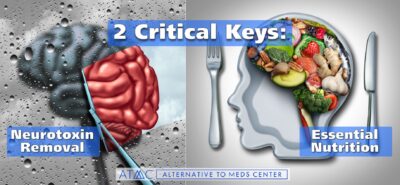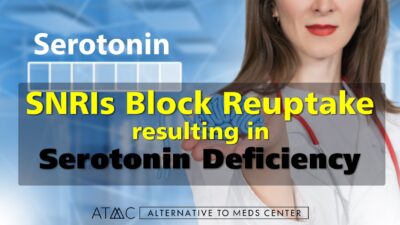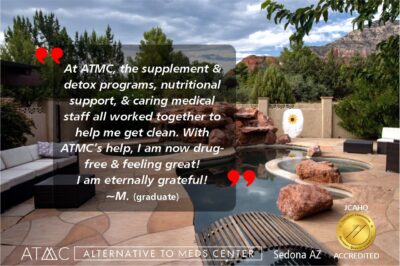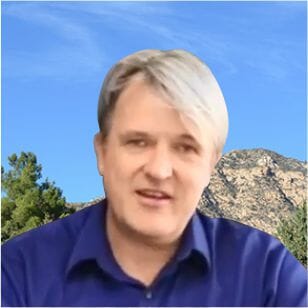1. Sharma A, et al., “S-Adenosylmethionine (SAMe) for Neuropsychiatric Disorders: A Clinician Oriented Review of Research.” J Clinic Psychiatry Jun 2017 [Internet] PMID28682528 [cited 2022 June 13]
2. Cui Y, Zheng Y, “A meta-analysis on the efficacy and safety of St John’s Wort extract in depression therapy in comparison with selective serotonin reuptake inhibitors in adults.” Neuropsychiatr Dis Treat. 2016 [Internet] PMID 27468236[cited 2022 June 13]
3. Editor NDNR, “Toxicity and Depression“, Naturopathic Doctor News and Review 2012 Mar 23 [Internet] [cited 2022 June 13]
4. Craft L, Perna F, “The Benefits of Exercise for the Clinically Depressed’ Prim Care Companion J Clin Psychiatry 2004 [Internet] PMID15361924 [cited 2022 June 13]
5. Kent S, et al., “Effect of sunlight exposure on cognitive function among depressed and non-depressed participants: a REGARDS cross-sectional study.” Environ Health 2009 July 09 [Internet] PMID 19638105 [cited 2022 June 13]
18. The drugs don’t work? antidepressants and the current and future pharmacological management of depression Ther Adv Psychopharmacol. 2012 Oct; 2(5): 179–188. Elizabeth Penncor responding author and Derek K. Tracy [cited 2022 June 13]
7. Antidepressant Discontinuation Syndrome, Am Fam Physician. 2006 Aug 1;74(3):449-456. [cited 2022 June 13]
15. How does cocaine produce its effects?. NIDA. 2020, June 11. [[cited 2022 June 13]
16. Bamalan OA, Al Khalili Y. Physiology, Serotonin. [Updated 2021 Mar 25]. In: StatPearls [Internet]. Treasure Island (FL): StatPearls Publishing; 2022 Jan-. Available from: https://www.ncbi.nlm.nih.gov/books/NBK545168/ [cited 2022 June 13]
17. Stahl SM, Grady MM, Moret C, Briley M. “SNRIs: their pharmacology, clinical efficacy, and tolerability in comparison with other classes of antidepressants.” CNS Spectr. 2005 Sep;10(9):732-47. doi: 10.1017/s1092852900019726. PMID: 16142213. [cited 2022 June 13]
20. FDA label Cymbalta (duloxetine) {2008 Dec 4] [cited 2022 June 13]
21. Health Quality Ontario . Psychotherapy for Major Depressive Disorder and Generalized Anxiety Disorder: A Health Technology Assessment. Ont Health Technol Assess Ser. 2017;17(15):1-167. Published 2017 Nov 13. [cited 2022 June 13]
22. Adjibade, M., Julia, C., Allès, B., Touvier, M., Lemogne, C., Srour, B., … & Kesse-Guyot, E. (2019). “Prospective association between ultra-processed food consumption and incident depressive symptoms in the French NutriNet-Santé cohort.” BMC medicine, 17(1), 78. [cited 2022 June 13]
23. Bell IR, Jasnoski ML, Kagan J, King DS. “Depression and allergies: survey of a nonclinical population.” Psychother Psychosom. 1991;55(1):24-31. doi: 10.1159/000288404. PMID: 1866437. [cited 2022 June 13]
24. Bahls SC, de Carvalho GA. “A relação entre a função tireoidiana e a depressão: uma revisão [The relation between thyroid function and depression: a review].” Braz J Psychiatry. 2004 Mar;26(1):41-9. Portuguese. doi: 10.1590/s1516-44462004000100012. Epub 2004 Mar 30. PMID: 15057840. [cited 2022 June 13]
25. Fu Z, Xi S. “The effects of heavy metals on human metabolism.” Toxicol Mech Methods. 2020 Mar;30(3):167-176. doi: 10.1080/15376516.2019.1701594. Epub 2019 Dec 17. PMID: 31818169.[cited 2022 June 13]
26. Cowen P, Browning M, “What has serotonin to do with depression?” Journal World Psychiatry 2015 June, 14(2): 158-160 [online] PMID 26043325 [cited 2022 June 13]
27. Lacasse J, Leo J, “Serotonin and Depression: A Disconnect Between the Advertisements and the Scientific Literature.” PLos Med 2005 Dec [online] PMID 16268734 [cited 2022 June 13]
28. Seisser W et al., “Chronic SSRI Treatment Exacerbates Serotonin Deficiency in Humanized Tph2 Mutant Mice.” ACS Chem Neurosci. 2013 Jan 16: 4(1): 84-88 [online] PMID 23336047 [cited 2022 June 13]
29. Cowen PJ. “Serotonin and depression: pathophysiological mechanism or marketing myth?” Trends Pharmacol Sci. 2008 Sep;29(9):433-6. doi: 10.1016/j.tips.2008.05.004. PMID: 18585794. [cited 2022 June 13]
30. McGill Information Presentation, ‘The Brain from Top to Bottom – Serotonin and other molecules involved in depression.” [online] N.D. [cited 2022 June 13]
31. Di Chiara G, Bassareo V. “Reward system and addiction: what dopamine does and doesn’t do.” Curr Opin Pharmacol. 2007 Feb;7(1):69-76. doi: 10.1016/j.coph.2006.11.003. Epub 2006 Dec 15. Erratum in: Curr Opin Pharmacol. 2007 Apr;7(2):233. PMID: 17174602. [cited 2022 June 13]
32. Thobois S, Vingerhoets F, Fraix V, Xie-Brustolin J, Mollion H, Costes N, Mertens P, Benabid AL, Pollak P, Broussolle E. “Role of dopaminergic treatment in dopamine receptor down-regulation in advanced Parkinson disease: a positron emission tomographic study.” Arch Neurol. 2004 Nov;61(11):1705-9. doi: 10.1001/archneur.61.11.1705. PMID: 15534182.[cited 2022 June 13]
33. Taylor C, et al., “Mechanisms of action of antidepressants: from neurotransmitter systems to signalling pathways.” Cell Signal PMID 15683730 [cited 2022 June 13]
34. Fava GA. “Can long-term treatment with antidepressant drugs worsen the course of depression?” J Clin Psychiatry. 2003 Feb;64(2):123-33. doi: 10.4088/jcp.v64n0204. PMID: 12633120. [cited 2022 June 13]
35. Smith B, “Inappropriate Prescribing.” American Psychological Association publication [online] June 2012 [cited 2022 June 13]
36. Berger M, et al., “The Expanded Biology of Serotonin” Annual Review of Medicine [online[ Feb 2009 PMID 19630576 [cited 2022 June 13]
37. Dmitrzak-Weglarz M, Reszka E. “Pathophysiology of Depression: Molecular Regulation of Melatonin Homeostasis – Current Status.” Neuropsychobiology. 2017;76(3):117-129. doi: 10.1159/000489470. Epub 2018 Jun 13. PMID: 29898451.[cited 2022 June 13]
38. Baughman F. There is no such thing as a psychiatric disorder/disease/chemical imbalance. PLoS Med. 2006;3(7):e318. doi:10.1371/journal.pmed.0030318 [cited 2022 June 13]
39. Lacasse JR, Leo J. Serotonin and depression: a disconnect between the advertisements and the scientific literature. PLoS Med. 2005;2(12):e392. doi:10.1371/journal.pmed.0020392 [cited 2022 Jan 21] [cited 2022 June 13]
40. Deacon BJ. The biomedical model of mental disorder: a critical analysis of its validity, utility, and effects on psychotherapy research. Clin Psychol Rev. 2013 Nov;33(7):846-61. doi: 10.1016/j.cpr.2012.09.007. Epub 2013 Apr 8. PMID: 23664634. [cited 2022 June 13]
41. Netz Y. Is the Comparison between Exercise and Pharmacologic Treatment of Depression in the Clinical Practice Guideline of the American College of Physicians Evidence-Based?. Front Pharmacol. 2017;8:257. Published 2017 May 15. doi:10.3389/fphar.2017.00257 [cited 2022 June 13]
42. Schuch F, Vancampfort D, Firth J, Rosenbaum S, Ward P, Reichert T, Bagatini NC, Bgeginski R, Stubbs B. Physical activity and sedentary behavior in people with major depressive disorder: A systematic review and meta-analysis. J Affect Disord. 2017 Mar 1;210:139-150. doi: 10.1016/j.jad.2016.10.050. Epub 2016 Nov 29. Erratum in: J Affect Disord. 2018 Jan 1;225:79. PMID: 28033521. [cited 2022 June 13]
43. Craft LL, Perna FM. The Benefits of Exercise for the Clinically Depressed. Prim Care Companion J Clin Psychiatry. 2004;6(3):104-111. doi:10.4088/pcc.v06n0301 [cited 2022 June 13]
44. Huang Q, Liu H, Suzuki K, Ma S, Liu C. Linking What We Eat to Our Mood: A Review of Diet, Dietary Antioxidants, and Depression. Antioxidants (Basel). 2019;8(9):376. Published 2019 Sep 5. doi:10.3390/antiox8090376 [cited 2022 June 13]
45. Hussain J, Cohen M. Clinical Effects of Regular Dry Sauna Bathing: A Systematic Review. Evid Based Complement Alternat Med. 2018;2018:1857413. Published 2018 Apr 24. doi:10.1155/2018/1857413 [cited 2022 June 13]
46. Birdsall TC. 5-Hydroxytryptophan: a clinically-effective serotonin precursor. Altern Med Rev. 1998 Aug;3(4):271-80. PMID: 9727088. [cited 2022 June 13]
47. Parker GB, Brotchie H, Graham RK. Vitamin D and depression. J Affect Disord. 2017 Jan 15;208:56-61. doi: 10.1016/j.jad.2016.08.082. Epub 2016 Oct 11. PMID: 27750060. [cited 2022 June 13]
48. Serefko A, Szopa A, Wlaź P, Nowak G, Radziwoń-Zaleska M, Skalski M, Poleszak E. Magnesium in depression. Pharmacol Rep. 2013;65(3):547-54. doi: 10.1016/s1734-1140(13)71032-6. PMID: 23950577. [cited 2022 June 13]
49. Osher Y, Belmaker RH. Omega-3 fatty acids in depression: a review of three studies. CNS Neurosci Ther. 2009 Summer;15(2):128-33. doi: 10.1111/j.1755-5949.2008.00061.x. PMID: 19499625; PMCID: PMC6494070. [cited 2022 June 13]
50. Lopresti AL, Drummond PD. Saffron (Crocus sativus) for depression: a systematic review of clinical studies and examination of underlying antidepressant mechanisms of action. Hum Psychopharmacol. 2014 Nov;29(6):517-27. doi: 10.1002/hup.2434. Epub 2014 Sep 22. PMID: 25384672. [cited 2022 June 13]
51. Mahajan T, Crown A, Checkley S, Farmer A, Lightman S. Atypical depression in growth hormone deficient adults, and the beneficial effects of growth hormone treatment on depression and quality of life. Eur J Endocrinol. 2004 Sep;151(3):325-32. doi: 10.1530/eje.0.1510325. PMID: 15362961. [cited 2022 June 13]
52. Young LM, Pipingas A, White DJ, Gauci S, Scholey A. A Systematic Review and Meta-Analysis of B Vitamin Supplementation on Depressive Symptoms, Anxiety, and Stress: Effects on Healthy and ‘At-Risk’ Individuals. Nutrients. 2019;11(9):2232. Published 2019 Sep 16. doi:10.3390/nu11092232 [cited 2022 June 13]
53. Limbana T, Khan F, Eskander N. Gut Microbiome and Depression: How Microbes Affect the Way We Think. Cureus. 2020;12(8):e9966. Published 2020 Aug 23. doi:10.7759/cureus.9966 [cited 2022 June 13]
54. Wang C, Bannuru R, Ramel J, Kupelnick B, Scott T, Schmid CH. Tai Chi on psychological well-being: systematic review and meta-analysis. BMC Complement Altern Med. 2010 May 21;10:23. doi: 10.1186/1472-6882-10-23. PMID: 20492638; PMCID: PMC2893078. [cited 2022 June 13]
55. Keng SL, Smoski MJ, Robins CJ. Effects of mindfulness on psychological health: a review of empirical studies. Clin Psychol Rev. 2011;31(6):1041-1056. doi:10.1016/j.cpr.2011.04.006 [cited 2022 June 13]
56. Lin LL, Li HP, Yang JW, et al. Acupuncture for Psychological Disorders Caused by Chronic Pain: A Review and Future Directions. Front Neurosci. 2021;14:626497. Published 2021 Jan 27. doi:10.3389/fnins.2020.626497 [cited 2022 June 13]
57. Brittanica [online] Norepinephrine [cited 2022 June 13]
58. Kang SG, et al., ” Duloxetine-induced Liver injury in patients with Major Depressive Disorder.” Psychiatry Investig J 2011 Sep [online 2011 Aug] PMID21994516 [cited 2022 June 13]

 Cymbalta, AKA duloxetine falls under the classification of serotonin-norepinephrine reuptake inhibitor (SNRI).17 Cymbalta is prescribed to treat depression, generalized anxiety disorder (GAD), chronic musculoskeletal pain (including back pain and arthritis), fibromyalgia, and peripheral diabetic neuropathy pain (hand, feet, arm, or leg nerve pain due to diabetes).20 Depression is the most frequent condition for prescribing Cymbalta.20 However, according to our studies, opting for Cymbalta natural alternatives often provides a superior choice.
Cymbalta, AKA duloxetine falls under the classification of serotonin-norepinephrine reuptake inhibitor (SNRI).17 Cymbalta is prescribed to treat depression, generalized anxiety disorder (GAD), chronic musculoskeletal pain (including back pain and arthritis), fibromyalgia, and peripheral diabetic neuropathy pain (hand, feet, arm, or leg nerve pain due to diabetes).20 Depression is the most frequent condition for prescribing Cymbalta.20 However, according to our studies, opting for Cymbalta natural alternatives often provides a superior choice. Change of diet — Keto-based, Paleo, or Mediterranean-style food choices are examples that can help avoid sugars and excess refined carbs, and provide a good balance between plant-based and protein-based foods.22
Change of diet — Keto-based, Paleo, or Mediterranean-style food choices are examples that can help avoid sugars and excess refined carbs, and provide a good balance between plant-based and protein-based foods.22 But we must remember, natural hormones and neurotransmitters such as serotonin and norepinephrine are designed for reuptake so they can circulate through the body. This recycling system provides a process of conservation. Serotonin plays many roles in the body, both in and outside of the brain and CNS.36 When a drug blocks serotonin from reuptake, enzymes can eventually cause degradation into unusable metabolites, resulting in little to no serotonin left.30
But we must remember, natural hormones and neurotransmitters such as serotonin and norepinephrine are designed for reuptake so they can circulate through the body. This recycling system provides a process of conservation. Serotonin plays many roles in the body, both in and outside of the brain and CNS.36 When a drug blocks serotonin from reuptake, enzymes can eventually cause degradation into unusable metabolites, resulting in little to no serotonin left.30 We provide natural substances to create neurochemistry stabilization.
We provide natural substances to create neurochemistry stabilization. 







